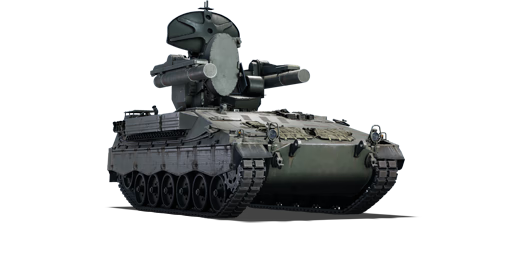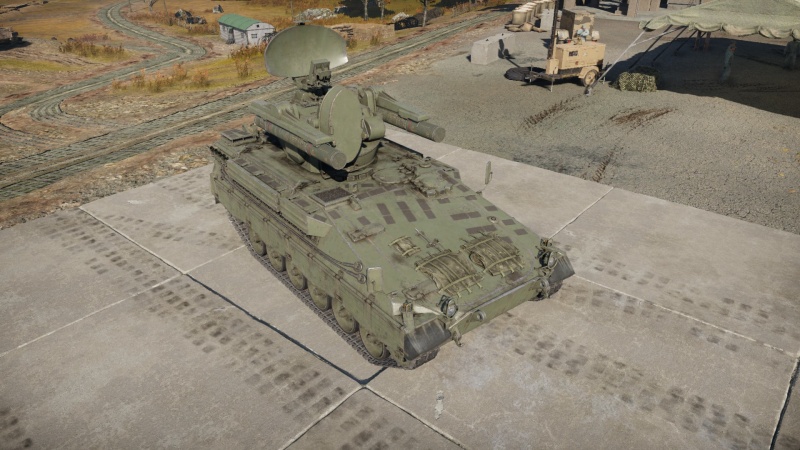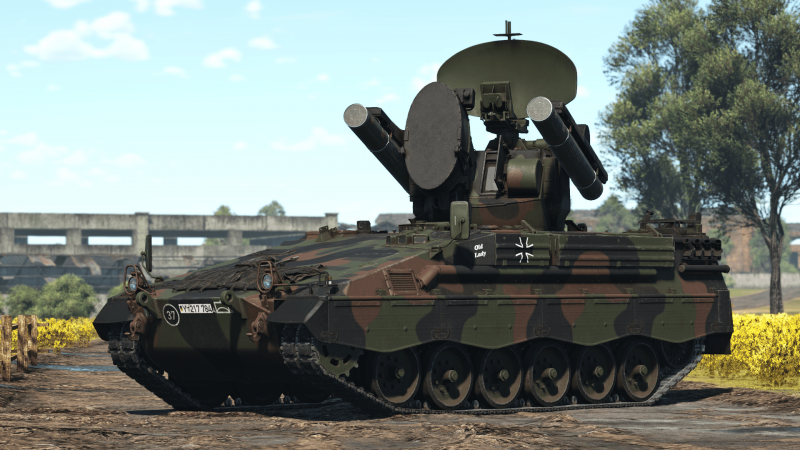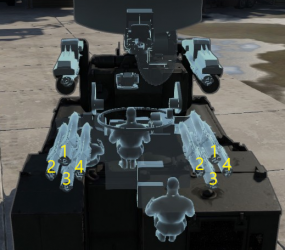Difference between revisions of "FlaRakPz 1"
(New Description Project / Description revised) |
U103691029 (talk | contribs) m (→Main armament: Autoloader) (Tag: Visual edit) |
||
| (One intermediate revision by one other user not shown) | |||
| Line 9: | Line 9: | ||
Starting development in 1963 and fielded from 1977 onwards, the Roland Surface-to-Air Missile (SAM) was a cornerstone of NATO air defense for multiple decades. The Roland SAM was developed as a Franco-German collaboration project, originally intended to defend airfields and frontline formations from enemy fixed and rotary wing aviation. The FlaRakPz 1 was one of the hulls modified to carry this new SAM, with the base hull being taken from the [[Marder IFV (Family) | Marder]] IFV. The Roland turret comes equipped with both a search and track radar, as well as an optical tracking system for use in good atmospheric conditions or in heavy jamming environments. It could fire the Roland 2 and Roland 3 SAMs, with the Roland 3 being an upgraded variant of the Roland 2 in terms of missile speed, warhead size and better guidance systems for all weather conditions. The FlaRakPz units were all retired in 2005, with its successor system (planned to be the LFK NG, a variant of the IRIS-T AAM) being cancelled in 2011 and its SHORAD (SHOrt Range Air Defense) role was transferred to the German Air Force instead. | Starting development in 1963 and fielded from 1977 onwards, the Roland Surface-to-Air Missile (SAM) was a cornerstone of NATO air defense for multiple decades. The Roland SAM was developed as a Franco-German collaboration project, originally intended to defend airfields and frontline formations from enemy fixed and rotary wing aviation. The FlaRakPz 1 was one of the hulls modified to carry this new SAM, with the base hull being taken from the [[Marder IFV (Family) | Marder]] IFV. The Roland turret comes equipped with both a search and track radar, as well as an optical tracking system for use in good atmospheric conditions or in heavy jamming environments. It could fire the Roland 2 and Roland 3 SAMs, with the Roland 3 being an upgraded variant of the Roland 2 in terms of missile speed, warhead size and better guidance systems for all weather conditions. The FlaRakPz units were all retired in 2005, with its successor system (planned to be the LFK NG, a variant of the IRIS-T AAM) being cancelled in 2011 and its SHORAD (SHOrt Range Air Defense) role was transferred to the German Air Force instead. | ||
| − | + | Introduced in [[Update 1.89 "Imperial Navy"]], the FlaRakPz 1 is Germany's preferred vehicle of choice for use against enemy rotary aviation; the missiles don't require a lock to fire like the [[Ozelot]] and [[Gepard 1A2]]'s [[FIM-92 Stinger|Stinger]] MANPADS surface-to-air missiles, and as the vehicle is equipped with an Infra-Red Search and Track radar (IRST), it can discreetly scan and lock enemy aircraft without alerting their RWRs. However, as the missiles have noticeable input delay when pulling in, they often struggle against fixed wing aviation, with even fairly low agility aircraft able to do a corkscrew style manoeuvre only for the Roland SAM to be unable to compensate and miss entirely. The missiles also have minimal penetrative capabilities against armour, unlike the dual-purpose MIM146 of the [[ADATS]], and if your missile is still airborne you are forced to wait out the flight duration or wait for the missile to detonate to start reloading. Overall, while the FlaRakPz 1 certainly has a niche, it's sadly held back by the very niche filling role it has due to a lack of flexibility against enemy targets. | |
== General info == | == General info == | ||
| Line 55: | Line 55: | ||
{| class="wikitable" style="text-align:center" width="100%" | {| class="wikitable" style="text-align:center" width="100%" | ||
|- | |- | ||
| − | ! colspan="5" | [[Roland|Roland SAM]] (x2) || colspan="5" | Turret rotation speed (°/s) | | + | ! colspan="5" | [[Roland|Roland SAM]] (x2) || colspan="5" | Turret rotation speed (°/s) || Reloading rate (seconds) |
|- | |- | ||
! Mode !! Capacity (Belt) !! Vertical !! Horizontal !! Stabilizer | ! Mode !! Capacity (Belt) !! Vertical !! Horizontal !! Stabilizer | ||
! Stock !! Upgraded !! Full !! Expert !! Aced | ! Stock !! Upgraded !! Full !! Expert !! Aced | ||
| − | ! | + | !Autoloader |
|- | |- | ||
! ''Arcade'' | ! ''Arcade'' | ||
| − | | rowspan="2" | 10 (2) || rowspan="2" | -10°/+80° || rowspan="2" | ±180° || rowspan="2" | N/A || 74.9 || 103.6 || 125.8 || 139.1 || 148 | + | | rowspan="2" | 10 (2) || rowspan="2" | -10°/+80° || rowspan="2" | ±180° || rowspan="2" | N/A || 74.9 || 103.6 || 125.8 || 139.1 || 148.0 || rowspan="2" | 5.00 |
|- | |- | ||
! ''Realistic'' | ! ''Realistic'' | ||
Latest revision as of 02:08, 17 April 2024
Contents
Description
Starting development in 1963 and fielded from 1977 onwards, the Roland Surface-to-Air Missile (SAM) was a cornerstone of NATO air defense for multiple decades. The Roland SAM was developed as a Franco-German collaboration project, originally intended to defend airfields and frontline formations from enemy fixed and rotary wing aviation. The FlaRakPz 1 was one of the hulls modified to carry this new SAM, with the base hull being taken from the Marder IFV. The Roland turret comes equipped with both a search and track radar, as well as an optical tracking system for use in good atmospheric conditions or in heavy jamming environments. It could fire the Roland 2 and Roland 3 SAMs, with the Roland 3 being an upgraded variant of the Roland 2 in terms of missile speed, warhead size and better guidance systems for all weather conditions. The FlaRakPz units were all retired in 2005, with its successor system (planned to be the LFK NG, a variant of the IRIS-T AAM) being cancelled in 2011 and its SHORAD (SHOrt Range Air Defense) role was transferred to the German Air Force instead.
Introduced in Update 1.89 "Imperial Navy", the FlaRakPz 1 is Germany's preferred vehicle of choice for use against enemy rotary aviation; the missiles don't require a lock to fire like the Ozelot and Gepard 1A2's Stinger MANPADS surface-to-air missiles, and as the vehicle is equipped with an Infra-Red Search and Track radar (IRST), it can discreetly scan and lock enemy aircraft without alerting their RWRs. However, as the missiles have noticeable input delay when pulling in, they often struggle against fixed wing aviation, with even fairly low agility aircraft able to do a corkscrew style manoeuvre only for the Roland SAM to be unable to compensate and miss entirely. The missiles also have minimal penetrative capabilities against armour, unlike the dual-purpose MIM146 of the ADATS, and if your missile is still airborne you are forced to wait out the flight duration or wait for the missile to detonate to start reloading. Overall, while the FlaRakPz 1 certainly has a niche, it's sadly held back by the very niche filling role it has due to a lack of flexibility against enemy targets.
General info
Survivability and armour
Describe armour protection. Note the most well protected and key weak areas. Appreciate the layout of modules as well as the number and location of crew members. Is the level of armour protection sufficient, is the placement of modules helpful for survival in combat? If necessary use a visual template to indicate the most secure and weak zones of the armour.
Armour type:
| Armour | Front (Slope angle) | Sides | Rear | Roof |
|---|---|---|---|---|
| Hull | ___ mm | ___ mm Top ___ mm Bottom |
___ mm | ___ - ___ mm |
| Turret | ___ - ___ mm Turret front ___ mm Gun mantlet |
___ - ___ mm | ___ - ___ mm | ___ - ___ mm |
| Cupola | ___ mm | ___ mm | ___ mm | ___ mm |
Notes:
Mobility
| Game Mode | Max Speed (km/h) | Weight (tons) | Engine power (horsepower) | Power-to-weight ratio (hp/ton) | |||
|---|---|---|---|---|---|---|---|
| Forward | Reverse | Stock | Upgraded | Stock | Upgraded | ||
| Arcade | Expression error: Unexpected * operator. | 852 | Expression error: Unexpected round operator. | __.__ | |||
| Realistic | 531 | Expression error: Unexpected round operator. | __.__ | ||||
The FlaRakPz 1 is powered by a MTU MB 833 Ea-500 that produces 441 kW (600 hp) at 2,200 RPM.
Modifications and economy
Armaments
Main armament
| Roland SAM (x2) | Turret rotation speed (°/s) | Reloading rate (seconds) | ||||||||
|---|---|---|---|---|---|---|---|---|---|---|
| Mode | Capacity (Belt) | Vertical | Horizontal | Stabilizer | Stock | Upgraded | Full | Expert | Aced | Autoloader |
| Arcade | 10 (2) | -10°/+80° | ±180° | N/A | 74.9 | 103.6 | 125.8 | 139.1 | 148.0 | 5.00 |
| Realistic | 50.6 | 59.5 | 72.3 | 79.9 | 85.0 | |||||
Ammunition
| Penetration statistics | |||||||
|---|---|---|---|---|---|---|---|
| Ammunition | Type of warhead |
Penetration @ 0° Angle of Attack (mm) | |||||
| 10 m | 100 m | 500 m | 1,000 m | 1,500 m | 2,000 m | ||
| Roland 2 | SAM | 39 | 39 | 39 | 39 | 39 | 39 |
| Roland 3 | SAM | 54 | 54 | 54 | 54 | 54 | 54 |
| Missile details | ||||||||||||
|---|---|---|---|---|---|---|---|---|---|---|---|---|
| Ammunition | Type of warhead |
Velocity (m/s) |
Range (m) |
Projectile mass (kg) |
Fuse delay (m) |
Fuse sensitivity (mm) |
Arming distance (m) |
Trigger radius (m) |
Explosive mass (TNT equivalent) (kg) |
Ricochet | ||
| 0% | 50% | 100% | ||||||||||
| Roland 2 | SAM | 500 | 6,300 | 65 | 1 | 0.1 | 300 | 6 | 4.59 | 79° | 80° | 81° |
| Roland 3 | SAM | 570 | 8,000 | 77 | 1 | 0.1 | 300 | 6 | 6.81 | 79° | 80° | 81° |
Ammo racks
| Full ammo |
1st rack empty |
2nd rack empty |
3rd rack empty |
4th rack empty |
Visual discrepancy |
|---|---|---|---|---|---|
| 5 | 4 (+1) | 3 (+2) | 2 (+3) | 1 (+4) | No |
Usage in battles
- Arcade Battles
The FlaRakPz 1 does not have any additional armaments to attack other vehicles or protect itself, limiting its offensive ability towards even slightly-armoured targets. Due to this, moving any distance from the spawn point will result in death due to the thin armour and increased visibility, due to vehicle markers, making the FlaRakPz 1 an easy target. Both the Roland 2 and Roland 3 SAMs have a maximum speed of 900 m/s, with payloads of 3.3 kg and 4.45 kg of Composition B respectably, more than enough to deal with the only aircraft type (helicopters) it will encounter in this game mode. Moving alongside allies or waiting in or near spawn areas - where the FlaRakPz 1 has the best view of the sky - will be rewarding as when engaging medium to heavily armoured units, the explosive mass of the missiles will be most useful in destroying or disabling targets, requiring knowledge of vulnerable spots on enemy vehicles to deliver a finishing blow. Due to the large explosive mass of both missiles, it can destroy light targets with overpressure.
- Realistic Battles
In Realistic Battles, the vehicle's primary purpose is as an anti-aircraft weapon. There is no weapons on the FlaRakPz 1 that can serve as meaningful anti-armour tools (although the Roland 3's 54 mm of penetration can allow creative players to penetrate through light-armour or tank roofs) and the armour may as well be nonexistent. The vehicle is quite mobile however, and so the mobility should be used alongside the FlaRakPz 1's excellent radars by getting into optimal positions to search and engage targets.
The FlaRakPz 1's battlefield performance is greatly assisted by its SAG MPDR-16 search radar. Able to search targets up to 16 kilometers away in a 360 degree angle, the FlaRakPz 1 can serve as a really good warning indicator to alert teammates of any incoming airborne threats. Accompanying the search radar is the Thomson-CSF Domino 30 tracking radar that allows the FlaRakPz 1 player to begin locking onto targets from 12 kilometers away, which can allow a lot of breathing room for players to first locate the aerial target, track it, then engage once it approaches the Roland missile's firing range (6.3 km on the Roland 2 and 8 km on the Roland 3).
One issue with the above mentioned attack strategy is when encountering an aircraft with a radar-warning receiver (RWR). The FlaRakPz 1's searching and tracking function will trigger their RWR, leading them to know a radar-equipped SPAA is present and will perform evasive manoeuvre such as using the terrain to mask itself. To prevent this, the FlaRakPz 1's search radar can be configured to use the Infrared Search and Track (IRST) feature, which tracks the enemy by its heat instead of by radar. This benefits by not notifying the enemy that a radar has got it locked, but the IRST feature may produce less accurate tracking than radar.
Once the FlaRakPz 1 has gotten an aerial target locked on by radar or IRST, fire a Roland 2/3 missile once the enemy aircraft has gotten into range. The missile is controlled by "semi-automatic command to line of sight" (SACLOS) which only requires the player to place the crosshair onto target and the missile will head towards the crosshair's center. Pointing directly at an aerial target will only be simple if attacking a hovering helicopter or a jet heading right towards the FlaRakPz 1, however most of the time when fighting fast-moving jets, the player-controlled crosshair may be able to track the aircraft faster than the missile. This will require the player to lead ahead of the aircraft with the crosshair, keeping an eye on the trailing missile to make sure its tracer is hovering right on top of the aircraft so that once it reaches the aircraft's range, it will detonate and take out or cripple the aircraft.
Note that the Roland missiles can be fired from the FlaRakPz 1 without a radar lock in case of emergencies, however this may require players to work a little harder to keep the FlaRakPz 1's turret continually pointing towards the enemy aircraft as the search/track radar does give some assistance in keeping the locked enemy in front of the FlaRakPz 1 turret. That said, the advantage of the FlaRakPz 1's ability to fire without a lock means that the enemy aircraft's countermeasures like flares or chaff will not affect the Roland missile flight, keeping the probability of a hit narrowed down to the player's skill and the enemy aircraft's ability to evade.
Pros and cons
Pros:
- Has Roland 3 missiles as a tier 2 modification, increasing the vehicle's offensive range to 8.5 km
- Roland 2 and Roland 3 missiles are reactive and manoeuvrable
- Active radar system with a scan range of 15 km
- Slightly higher-than-average max speed (70 km/h)
- Autoloader with 5-second reload
- Roland SAMs maintain their top speed up until their respective max range, and do not decelerate like other SAMs
Cons:
- Significantly lower missile velocity compared to the ADATS (1,200 m/s) and Stormer HVM (1,400 m/s)
- Only two missiles available before having to reload
- Lack of additional armament for close-range or armoured targets
History
Describe the history of the creation and combat usage of the vehicle in more detail than in the introduction. If the historical reference turns out to be too long, take it to a separate article, taking a link to the article about the vehicle and adding a block "/History" (example: https://wiki.warthunder.com/(Vehicle-name)/History) and add a link to it here using the main template. Be sure to reference text and sources by using <ref></ref>, as well as adding them at the end of the article with <references />. This section may also include the vehicle's dev blog entry (if applicable) and the in-game encyclopedia description (under === In-game description ===, also if applicable).
Media
- Skins
- Videos
See also
Links to the articles on the War Thunder Wiki that you think will be useful for the reader, for example:
- reference to the series of the vehicles;
- links to approximate analogues of other nations and research trees.
External links
| Germany anti-aircraft vehicles | |
|---|---|
| Wheeled | Sd.Kfz.222 |
| Half-track | Sd.Kfz.251/21 · Sd.Kfz. 6/2 |
| Flakpanzer IV | Wirbelwind · Ostwind · Ostwind II · Kugelblitz · Zerstörer 45 |
| Other Flakpanzers | Flakpanzer I · Flakpanzer 38 · Flakpanzer 341 |
| Wiesel AWC | Wiesel 1A4 · Ozelot |
| Radar SPAAG | Gepard · Gepard 1A2 |
| Missile SPAA | FlaRakPz 1 · FlaRakRad |







